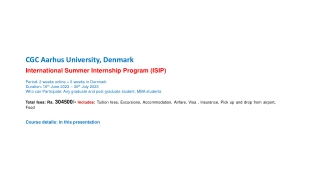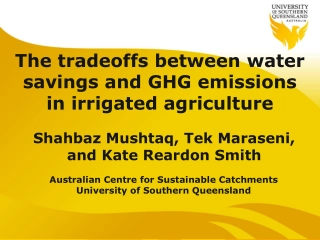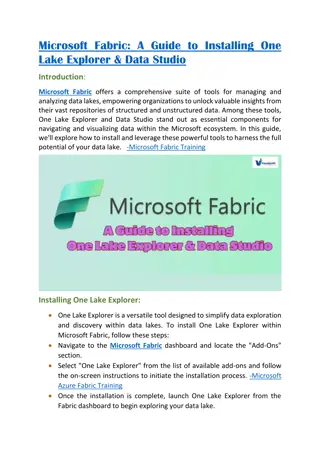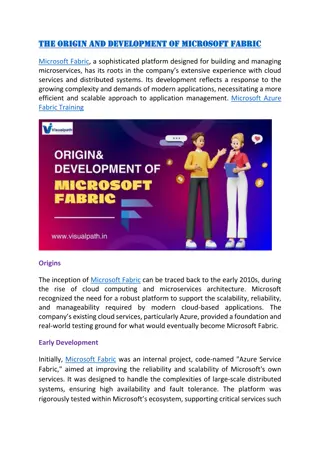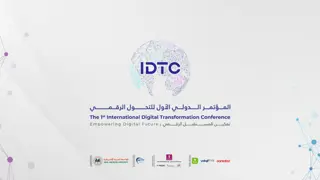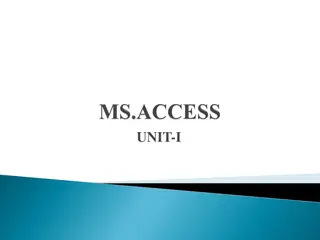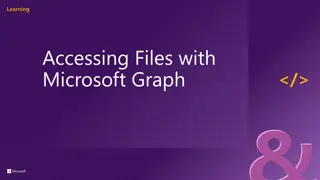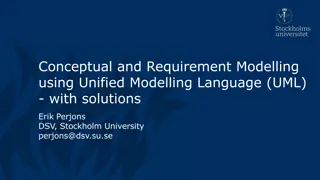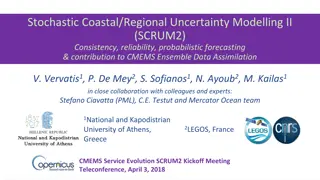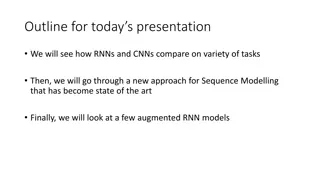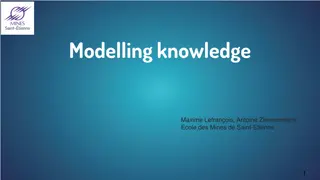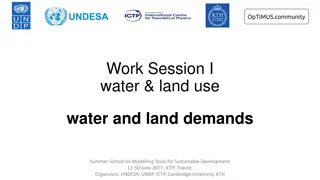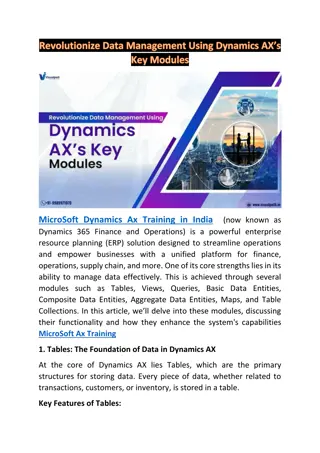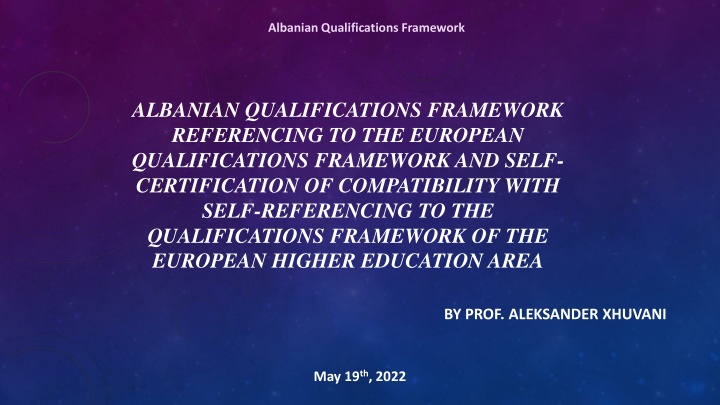
Introduction to Service-Oriented Modelling and Microsoft Service Business Architecture
Service-Oriented Modelling (SOM) is a capability that enables incremental, repeatable, and consistent service orientation within enterprises or cloud-based architectures. It focuses on business value alignment with IT architecture, supported by Microsoft Services Business Architecture (MSBA) tools. Discover how SOM optimizes service orientation, business process automation, and optimization for increased productivity.
Download Presentation

Please find below an Image/Link to download the presentation.
The content on the website is provided AS IS for your information and personal use only. It may not be sold, licensed, or shared on other websites without obtaining consent from the author. If you encounter any issues during the download, it is possible that the publisher has removed the file from their server.
You are allowed to download the files provided on this website for personal or commercial use, subject to the condition that they are used lawfully. All files are the property of their respective owners.
The content on the website is provided AS IS for your information and personal use only. It may not be sold, licensed, or shared on other websites without obtaining consent from the author.
E N D
Presentation Transcript
Albanian Qualifications Framework ALBANIAN QUALIFICATIONS FRAMEWORK REFERENCING TO THE EUROPEAN QUALIFICATIONS FRAMEWORK AND SELF- CERTIFICATION OF COMPATIBILITY WITH SELF-REFERENCING TO THE QUALIFICATIONS FRAMEWORK OF THE EUROPEAN HIGHER EDUCATION AREA BY PROF. ALEKSANDER XHUVANI May 19th, 2022
Thematic discussion on Qualifications Framework Albanian Educational Map EDUCATIONAL MAP LEGEND: Pro Certificate - Professional post-secondary Certificate Pro Diploma - Professional post-secondary Diploma Pre-primary educational system: 2121 institutions, 11.4 % are private , 88.6 % are public; Primary education: 463 institutions, 100% public Lower secondary 1228 institutions, 10% are private, 90% are public; General and oriented education, 453 institutions, 24 % are private, 76% are public; Vocational Education, 45 institutions, 35 public providers and 10 private ones Higher education: 41 Institutions, 26 are private, are 15 public secondary March 15th, 2022 Slide 2
Thematic discussion on Qualifications Framework Phases the AQF went through The AQF process started with the support of EU CARDS AFP 3 in the area of the Bologna Process in HE and VET and first AQF task Force is established by both Ministers of Education and Labour.; 2006 2010 AQF Task Force in cooperation with EU CARDS AFP 3 project proposed the first AQF Law approved by the Parliament in 2010, describing the main features of the AQF 2014 The NESS 2014-2020 Action plan foresaw a review and implementation of the AQF law, in order to further develop and implement AQF. 2015 The new joint ministerial Task Force with representatives of social partners, VET providers and HEI was established with the mandate to further develop and implement an operational AQF and support referencing process. 2017 AQF task force proposed the amendment of the AQF law of 2010, which has been approved in 2018 by Albanian Parliament; The AQF Task Force created the Technical Group of Experts in view of detailing the AQF level descriptors, establishing the sectorial committees and defining criteria and procedures for inclusion of LLL qualifications in AQF 2018 NESS is extended till 2022, makes several references to the AQF priority development aspects like the endorsement of national catalogue for vocational qualifications, establishing first sectorial committees etc By legal acts on AQF level descriptors establishing the sectorial committees and defining criteria and procedures for inclusion of LLL qualifications in AQF, adopted 2019 National catalogue for vocational qualifications in VET adopted and joint ministerial order to establish the sectorial committee in ICT adopted. Referencing with EQF and QF EHEA 2021 2021 March 15th, 2022 Slide 3
Thematic discussion on Qualifications Framework AQF Organigramme LEVEL 1 First level Pre-university (general): compulsory education LEVEL 2 Second VET level: Professional Certificate issued at the conclusion of the two-year program for semi-skilled workers; LEVEL 3 Third VET level: -Professional certificate issued at the end of a one-year program for skilled workers; -Professional certificate issued at the end of a three-years program for skilled workers; -Professional Certificate issued upon completion of an apprenticeship programme; LEVEL 4 Fourth VET level: -State Professional Matura Diploma issued upon completion of the vocational high school programme; -Professional Certificate issued at the conclusion of the four-year study program for middle technicians / managers; -Professional certificate issued at the conclusion of the one-year program for middle technicians /managers; At the time being: -Professional Certificate issued at the conclusion of the two-year program for middle technicians / managers; GENERAL PRE-UNIVERSITY EDUCATION , HIGHER EDUCATION AND LLL under the responsibility of the Ministry of Education end Sports (MES) -Professional Certificate issued at the end of an apprenticeship programme. VOCATIONAL EDUCATION AND TRAINING and LLL under the responsibility of Ministry of Finance and Economy (MFE) Fourth Pre-university general level: -State Matura Diploma issued upon completion of the high school programme; MES and MFE AQF Task Force March 15th, 2022 Slide 4
Thematic discussion on Qualifications Framework AQF Diagram LEVEL 5 Fifth level post-secondary in VET: Professional certificate non-university study program after secondary education Short Cycle in HE: Professional Certificate (1year - 60 ECTS) Professional Diploma (2 years 120 ECTS) LEVEL 6 First HE level: Bachelor Diploma (at least 3 years at least 180 ECTS) LEVEL 7 Second HE level Professional Master - (1 year - 60 ECTS) Professional Master (2 years -120 ECTS Master of Sciences or Master of Arts (2 years 120 ECTS) Integrated Master (5-6 years 300-360ECTS) AQF legal framework : - the law no. 23/2018 after the first law of 2010; - DCM no. 426, of 26.6.2019 Organization, functioning and criteria selection for the members of sectoral committees and their reward ; - procedures for long-life learning qualifications, according to the Albanian qualifications framework levels for education and professional training - DCM no. 428, of 26.6.2019 The approval of table detailed descriptions of the Albanian qualifications framework levels LEVEL 8 Third HE level Executive Master (1 year - 60 ECTS) Executive Master (2 years - 120 ECTS) DCM no. 427, of 26.6.2019 The approval of criteria and inclusion 2 years (Long-term specializations (at least 2 years at least 120 ECTS) (Doctoral Degree (3 years up to 5 years) LEVELS 2-5, 7-8 Lifelong learning qualifications March 15th, 2022 Slide 5
Thematic discussion on Qualifications Framework Governance structure Implementation institutions Governing institutions Advisory bodies Council for Higher Education and Science (CHES) Agency for Quality Assurance in Higher Education (AQAHE) Ministry of Education and Sports (MES) Agency for Quality Assurance in Pre- university Education (AQAPE), General Directorate for Pre-university Education, RED Albanian Qualifications Framework Task Force Centre of Education Services (CES) Ministry of Finance and Economy (MFE) National VET Council National Agency of Vocational Education and Training and Qualifications (NAVETQ) National Agency for Employment and Skills Up to 10 Sectorial Committees March 15th, 2022 Slide 6
Thematic discussion on Qualifications Framework EQF to AQF EQF versus AQF EQF levels AQF Levels LEVEL 1 No equivalency in the AQF LEVEL 2 LEVEL 1 LEVEL 2 LEVEL 2 LEVEL 3 LEVEL 3 LEVEL 4 LEVEL 4 LEVEL 5 LEVEL 5 LEVEL 6 LEVEL 6 LEVEL 7 LEVEL 7 LEVEL 8 LEVEL 8 Following the Albanian legal framework there is no any qualification awarded corresponding to the EQF first level March 15th, 2022 Slide 7
Thematic discussion on Qualifications Framework Albanian HE Educational Map Evolution of the number of students in the Albanian HE system 160000 148339 141471 139043 131833 130264 140000 123797 123159 116896 113277 120000 108516 104802 97830 100000 80000 60000 40000 25462 26417 25766 25180 24575 23317 20000 0 2015-2016 2016-2017 2017-2018 2018-2019 2019-2020 2020-2021 Overall Public HEIs Private HEIs From post-secondary vocational training there is no any direct bridge to HE system (only via maturity exam) From post-secondary HE qualification there is a conditional direct bridge to the Bachelor or Integrated Master studies Lower secondary education One can observe the decreasing number of students within the last years due to: demographic evolution; brain drain. March 15th, 2022 Slide 8
Thematic discussion on Qualifications Framework Albanian HE Educational Map Lower secondary education HE system is led by the law 85/2015 (after 2007 and 2010 laws) March 15th, 2022 Slide 9
Thematic discussion on Qualifications Framework Albanian HE Qualification QA Slide 10 March 15th, 2022
Thematic discussion on Qualifications Framework Albanian HE Qualification QA A loop scheme in the respect of HEI autonomy with three check-points: 1. Licencing process led by the MES 2. Student matriculation led by the CES 3. Accreditation process led by the AQAHE Lower secondary education The AL HE system is governed by the HE Law no.85/2015, entirely Bologna Process oriented March 15th, 2022 Slide 11
Thematic discussion on Qualifications Framework Albanian referencing report Level descriptor's philosophy KNOWLEDGE COMPETENCES Competences in terms of autonomy & responsibility Statements on complexity of general and vocational knowledge necessary for performing a set of jobs or further learning SKILLS Cognitive, psychomotor and/or social skills, differentiation of which is determined by the nature of the set of jobs, complexity of problem, type of communication, handling resources and materials March 15th, 2022 Slide 12
Bologna Thematic Peer Group A on Qualifications Framework Albanian referencing report AQF Level 6 descriptors AQF level Knowledge Skills Responsibility and autonomy Bachelor qualities and transferable skills necessary for employment requiring the exercise of personal responsibility and decision- making; 1. knowledge and critical understanding of the well-established principles of their areas of study, and of the way in which those principles have developed; ability to apply underlying concepts and principles outside the context in which they were first studied, including, where appropriate, the application of those principles in an employment context; knowledge of the main methods of enquiry in their subjects, and ability to evaluate critically the appropriateness of different approaches to solving problems in the field of study; an understanding of the limits of their knowledge, and how this influences analyses and interpretation based on that knowledge. 1. use a range of established techniques to initiate and undertake critical analysis of information, and to propose solutions to problems arising from that analysis; effectively communicate information, arguments, and analysis, in a variety of forms to specialist and non-specialist environment audiences, and deploy key techniques of the discipline effectively; undertake further training, develop existing skills and acquire new competences that will enable them to assume significant responsibility within organisations. 2. 2. 6 3. 3. 4. March 15th, 2022 Slide 13
Thematic discussion on Qualifications Framework Albanian referencing report AQF Level 5 descriptors to Dublin ones March 15th, 2022 Slide 14
Thematic discussion on Qualifications Framework Albanian referencing report structure GENERAL INTRODUCTION 1 - DESCRIPTION OF THE EDUCATION SYSTEM IN ALBANIA 2 - EUROPEAN BACKGROUND 3 - ALBANIAN QUALIFICATIONS FRAMEWORK 4 - REFERENCING AND SELF-CERTIFICATION OF THE AQF TO THE EQF AND QF-EHEA 5 - FULFILMENT OF CRITERIA AND PROCEDURES 6 - FURTHER DEVELOPMENT OF THE AQF REFERENCES APPENDIX March 15th, 2022 Slide 15
Bologna Thematic Peer Group A on Qualifications Framework Albanian referencing report 5 - FULFILMENT OF REFERENCING CRITERIA AND PROCEDURES - Referencing criteria of the AQF versus the EQF - Self-Certification of the AQF versus the QF-EHEA 10 CRITERIA 7 CRITERIA Response to the QF-EHEA Criteria and Procedures HE Albanian HE European AQF EQF Qualifications Qualifications Level Level In Albania, the competent national bodies certify the compatibility of the AQF with the QF EHEA ; MES has been the co-initiator and co-coordinator (together with the MFE) in all phases in the development and implementation of the AQF; The self-certification process have involved both local stakeholders international experts; The completion of the self-certification process shall be noted on Diploma Supplements issued subsequently by showing the link between the AQF and the European frameworks; Succeeding the process of AQF referencing is also due to the group of experts involved enough big and small to be efficient , nationally and internationally and to the hardworking & accuracy by implying a triple check to each national particularity. definition definition Post-secondary Post-secondary HE degree 5 5 Certificate (60 ECTS) Diploma (120 ECTS) Short cycles Bachelor degree Bachelor degree 6 6 (180 ECTS) First HE cycle Master degrees Master degree Professional (60 ECTS); Professional (120 ECTS); of Science (120 ECTS) 7 7 Second HE cycle Executive Master (60 ECTS); Executive Master (120 ECTS); Doctoral studies Doctoral studies 8 8 Third HE cycle Comparison between AQF descriptors and Dublin s March 15th, 2022 Slide 16
REFERENCING PROCESS AND ALBANIAN HEIs
Albanian HEI Output Input MODEL - REFERENCING Labour market Output : qualification HEI
Albanian HEI Diploma with its title Input : qualification Output : qualification Learning outcomes Knowledge Skills Competence A&R
Albanian HEI Referencing : 2 processes Go out any HEI Come to any HEI Letters of credence
Albanian HEI Qualification Letters of credence Quant Diploma Education Title DS Qual
Albanian HEI Education Title Study Program Courses (modules)
Albanian HEI Set of courses, composed in groups: methodological preparation and general culture preparation for scientific discipline subdisciplines, profiles and elective subject groups foreign languages, computer knowledge, professional practice closing obligations Study Program Expressed in ECTS points Presented in the DS with LO Bachelor in any area
Albanian HEI AQF LEVEL Study Course KNOWLEDGE SKILLS COMPETENCE (A&R) Definition: Database Design
Albanian HEI Bachelor degree level 6 of AQF; 6 ECTS points AQF LEVEL One semester
Albanian HEI 1. relational and object-oriented database models; KNOWLEDGE 2. data processing models; 3. models of data control.
Albanian HEI 1. conceive of a relational database; 2. conceive the forms for filling the database; SKILLS 3. conceive standard queries; 4. conceive the specific interface with the database.
Albanian HEI implement an application COMPETENCE (A&R) in a database management system, alone or in a team.
Albanian HEI AQF LEVEL Diploma Supplement KNOWLEDGE SKILLS COMPETENCE (A&R)
Albanian HEI Level 6 according to AQF; 180 ECTS points AQF LEVEL Three years
Albanian HEI The study program of the first cycle in the field of computer engineering offers basic engineering knowledge not only of general sciences, but also of basic sciences of computer engineering, hardware and software as well as languages and techniques. of programming. KNOWLEDGE
Albanian HEI On the other hand, this program gives the graduate the opportunity to knead with critical thinking so that it looks not only at the design aspects of the software or computer system, but also those of their optimal dimensioning and management. SKILLS
Albanian HEI On the other hand, this study program gives the graduate the opportunity of using data processing system architecture, using operating systems, designing and implementing databases, developing distributed network protocols, architectures and network services, software engineering, Web technologies, graphic and multimedia applications, organizing the security and protection of network traffic systems. COMPTENCIES A&R
Albanian HEI Referencing : 2 processes Go out ofany HEI Come to any HEI Kingdom of quality
Albanian HEI Kingdom of quality is guaranteed by our 3 mousquetaires ARAMIS Porthos Athos personifying Autonomy & Responsibility personifying knowledge personifying Skills
Albanian HEI From our Kingdom of quality to the whole World of Work D Artagnan personifying our graduated fellows making them reverence to
From Tirana University THANK YOU !

